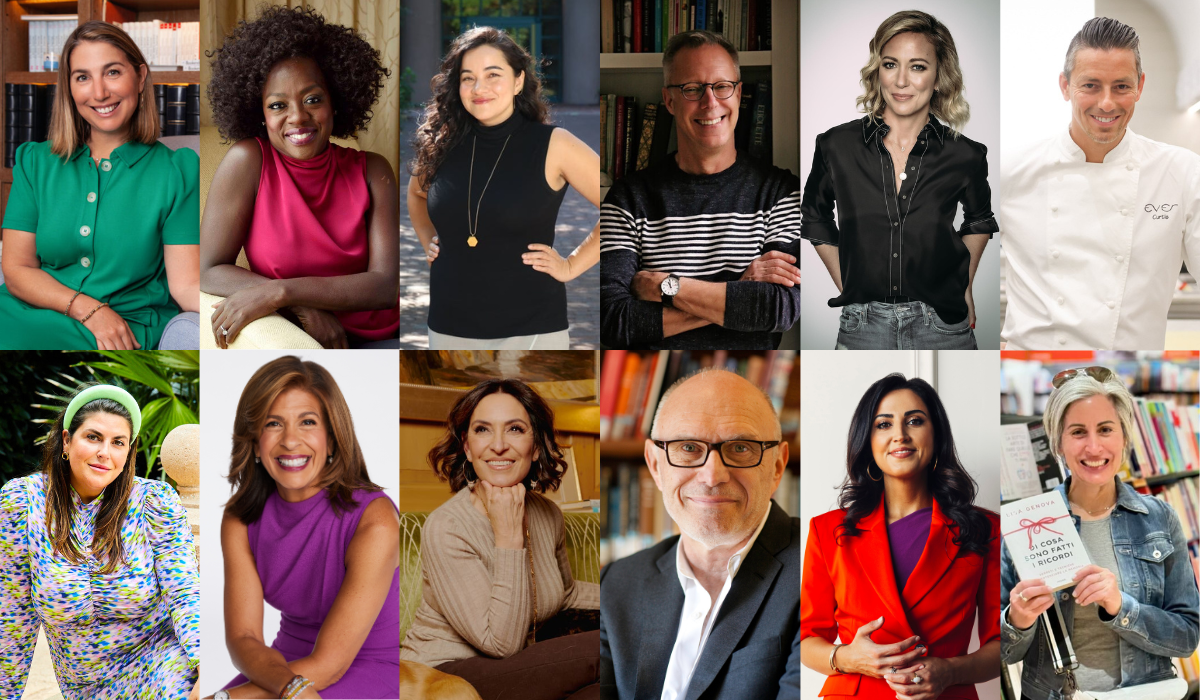What Does Success Really Mean?

What does success mean to you?
In a world that often measures success in titles, accolades, bank balances, and things, it can be easy to forget that success is deeply personal. It’s shaped by our life experiences, our values, and the moments that leave us changed forever.
In a recent essay in her weekly I’ve Been Thinking column, Maria Shriver contemplated the topic. “What does success even feel like today?” she asked. “Is it fleeting? Is it internal? Are those who flash their success truly happier? I wonder.” She went on to share how her ideas about success have shifted over the years: “I used to think success was a specific accomplishment, but I’ve come to understand it as a feeling of contentment, of peace, of knowing I’m exactly where I’m supposed to be.”
Maria’s essay struck a nerve, and we received hundreds of comments from our Sunday Paper community members. This inspired us to ask a diverse group of thinkers, creators, and everyday wisdom-sharers for their answers to the simple yet profound question: What does success mean to you?
Read on for their reflections—a mosaic of thoughtful, soulful and sometimes surprising insights that we hope will help you continue to contemplate what success means to you.
Hoda Kotb, journalist, New York Times bestselling author of seven books (including the forthcoming Jump and Find Joy: Embracing Change in Every Season of Life) and founder and CEO of Joy 101
“What do you do for work?"
To me, the answer to that question was always how I defined success. For decades, I wore blinders as I charged up the mountain, climbing farther and farther up—happily—to achieve my dreams in broadcast journalism.
Then, in my fifties, one phone call from an adoption agency redefined success.
“She's here.”
When Haley and then Hope came into my world, the definition of success suddenly included more. Elated, I took off my blinders and put on my “Mommy” hat. For the first time, my best life included more than just a career. I was first-and-foremost a mom and there was room to find fulfillment in work.
Heading through my sixties, I'm excited to explore and enjoy this bigger, broader version of success, including becoming a beginner again. Starting my new venture, Joy 101, is challenging, exhilarating, and so very gratifying to share with my daughters by my side.
And who knows what success looks like in the future...the word keeps redefining itself!
Viola Davis, award-winning actress, philanthropist, and CEO/co-founder of JuVee Productions and JVL Media LLC
My definition of success is to make people feel less alone. So many of us suffer from terminal “aloneness”—a feeling that God has passed us by, that we are not worthy. In all I do, I want to be the balm.
Suzy Welch, award-winning NYU Stern School of Business professor and New York Times best-selling author of Becoming You: A Proven Method for Crafting Your Authentic Life and Career
I was raised in a family where the definition of success was so indisputable that we didn’t even discuss it. But we all knew it went like this: Win so that everyone can see it. Then I had kids, who weren’t so keen on winning for public consumption. And I got a divorce, which sure felt like losing. And then, oops, I got fired from a job I loved and had to reinvent myself from scratch.
That’s a journey which continues. Every. Single. Day.
But here’s the thing. Over the past two decades, my life’s work has been the study of what success means. That’s my literal job as a professor! And I’ve come to realize, both through research and practice, that success is exquisitely personal, and can only happen on your own terms, when your life-as-lived reflects the fingerprint of your unique values.
When that happens, everyone may not see it, but they can feel it. Especially you.
Brooke Baldwin, journalist, television host, and author of Huddle: How Women Unlock Their Collective Power
Unraveling, for me, began the moment I walked away—suddenly and without explanation—from what I once believed was my dream job as an anchor at CNN. That departure cracked something wide open inside me. I was no longer anchored by the structure, identity, or steady paycheck that had defined my entire adult life. Living without that “net” forced me to confront who I was without the title, to reckon with what was true versus what I perceived as “safe.”
In that tender in-between, I discovered The Way of Integrity by Martha Beck—a book that changed my life. Her wisdom taught me that real freedom begins when we stop betraying ourselves (at work, in a marriage, etc.) and to always, always tell the truth. My unraveling, it turns out, is my “success”—my return to my truest self.
Miroslav Volf, PhD, the Henry B. Wright Professor of Theology at Yale Divinity School, founding director of the Yale Center for Faith and Culture, and author of the New York Times bestseller, Life Worth Living, and most recently The Cost of Ambition
I have banished “success” from the vocabulary I use to describe my aspiration in life. I do use the word. “Success!” I exclaim, after a flourless chocolate cake I am baking turns out just right. But I refuse to worry about whether I am a successful human being or not.
Success in life is a false god, Maria suggested in her recent essay. I agree. Here is one reason why: Success is insatiable and often unforgivably demanding.
Chasing after success is like riding a bicycle. If we don’t move forward, we fall. Worse, we are not at liberty to ride at our own pace. Whether we want it or not, we are in a race, condemned to paddle faster and faster. If we are unable, the merciless god of success abandons us, leaving us with self-loathing and depression; we appear to ourselves as nobodies.
Striving for success will make most of us unhappy most of the time. For we are successful only if we are among the best in the group with which we compare ourselves, if we are superior to most. Since everybody is striving, any superiority we achieve will be unstable, momentary— always in danger of turning success into its opposite, a failure.
That’s why I reject striving for superiority and success. Instead, I strive for excellence in things I consider to be good.
Lisa Genova, New York Times bestselling author of Still Alice, Remember: The Science of Memory and the Art of Forgetting, More or Less Maddy, and others
When my oldest child was three, we attended the town Easter egg hunt. Wearing bunny ears atop her mop of curly hair, she dashed here and there as she spotted foil-wrapped chocolate eggs "hidden" on a wide-open expanse of lawn. After adding a good handful of eggs to her basket, she stopped searching. But there were still plenty of eggs strewn about in plain view, and the other kids continued hunting. I pointed and said, "Look! There's an egg over there!" She spied the egg, then turned her gaze back to me and said, "I have enough." And to that I immediately thought, "My girl is going to know how to be happy."
I've spent a lot of my life striving for success. I was valedictorian of my college class, earned a PhD in neuroscience, published my research in prestigious scientific journals, and became a New York Times bestselling author. Each successful milestone was a tangible measure of accomplishment, and every achievement added to my sense of status and self-worth. And with these kinds of successes also came the assurance that I could afford to pay the bills.
But as I've gotten older, I've perceived a significant shift from striving for success to feeling enormous satisfaction in having enough. I still love when one of my books hits a bestseller list, and yet I experience a deeper, more meaningful joy in receiving a dm from a reader with Huntington's who felt seen and validated on the pages, or from a conversation with a parent of a child with bipolar who shares that she now feels hopeful.
Meaningful connection. Knowing that what I've created is helping others. This is the kind of success I'm focusing on these days. I have enough eggs in my basket, and I feel happy.
Steven Petrow, award-winning journalist and columnist for the Washington Post and USA Today and author of The Joy You Make: Find the Silver Linings—Even on Your Darkest Days
After my dad died in 2017, my siblings and I wrestled with what to say on his grave marker. In the end, we agreed to stick with the facts—“Journalist and Professor”—because his identity had been defined by his professional successes, which included an Emmy Award and university teaching honor. “Professor” as in Professor Petrow might just as well have been his first name. But as he got older, I noticed those accomplishments didn’t sustain him in the same way. In a slightly veiled memoir, my dad wrote, “All his life he drove a four-door family sedan but when motorcyclists roared past him on his left, he felt that life had passed him by as well.” My heart broke for him.
In many ways I was “a chip off the old block.” Like him I was a journalist, author, sometimes teacher. But I didn’t want to end up like him. As I often have in my life, I turned to some reading material, in this case an essay by Mike Sturm who’d written about the impact of small moments. “A life is made up of moments,” Sturm wrote. “A person’s character, then, is also made up of moments. How they acted at some moment, what they did for others at some moment, how they made others feel at some moment.” I could now see a new path and a new way to understand success. Of course, my mother was ahead of us all. When she died, we took about one second to decide what to write on her marker: “Much Loved.”
Amina Al Tai, executive coach, speaker, and USA Today bestselling author of The Ambition Trap: How to Stop Chasing and Start Living
I’m the child of immigrants, and I learned very early on to put my head down, work hard, achieve everything there was to get a gold star in, and that would be a successful life. But six years into my career, I got a call from my frantic physician informing me that that way of working was literally killing me and I was mere days away from multiple organ failure. My workaholic tendencies and painful relationship to success were about to take me out for good.
After my health scare, I put my ambition under the microscope, and a distressing, though very common, pattern emerged. Like most ambitious folks I knew, I felt like my work wasn’t just a job but my whole personality. This ethos no doubt cost me my relationships, my hobbies, and ultimately my physical and mental health.
I am by no means advocating for anyone to be less successful or to renounce their ambition. In fact, I just wrote a whole book on this. What I did after my health crisis, and what I’ve taught others to do as a coach ever since, is to be in the right relationship with their ambition.
And part of that right relationship starts with this: We get to define success for ourselves. For ourselves is the operative phrase here, because so many of us are operating from unconscious beliefs and core wounds that were handed to us by family, culture, or institutions. These inherited definitions and experiences are often driving our lives in unhealthy ways, and we don’t even realize it. Moreover, there are also cultural scripts about who is considered successful, and if we’re not careful, we can internalize these and weaponize them against ourselves.
One of the most important reframes for me was understanding that success and ambition don’t always have to mean “more for more’s sake all the time.” We need to allow them to be cyclical, just like nature. The reality is, ambition in its purest form isn’t about relentless accumulation no matter the cost—it’s simply a desire for more life. And that desire for more life requires cultivation, pacing, replenishing, nurturing, resting, and growth, just like the earth around us.
Corinne Low, associate professor of business economics and public policy at the Wharton School of the University of Pennsylvania and author of the forthcoming Having It All: What Data Tells Us About Women’s Lives and Getting the Most Out of Yours
To me success means achieving what brings you utility—which is the economics word for deep joy and satisfaction in your life. For some people, that might be having a thriving career and focusing on that, but for others it's a balance between work and family, or it might be prioritizing things outside the labor force. My saying is “don't compare yourself to someone who does not have the same utility function as you do.” I think so often we pick one dimension where someone else is thriving—like their career is going more quickly than ours—and judge ourselves compared to that, when the reality is, taking a more winding or slower path on our career might be a result of our choices in response to other things we value that bring us utility, like spending time with family or friends, or even just taking care of ourselves and avoiding burnout.
After getting divorced, I had to rethink the idea that achieving certain pre-set models I had in my mind equaled success—a second kid close in age, an intact marriage, and a family that looked like most of my friends’. Trying to make that work had left me depleted, exhausted, and deeply unhappy in ways that I couldn't even recognize until I was out of that situation. If I was happier divorced and exploring a new queer identity, didn’t that mean that was actually more successful?
I just welcomed a new baby at 40, exactly eight years younger than my first, an age gap that tends to raise eyebrows. But how could I take the joy of rediscovering partnership and early parenthood on my own terms with new wisdom and more support as anything other than success?
Katie Sturino, founder of MEGABABE, author of Sunny Side Up and Body Talk, and a body acceptance advocate
Success, to me, means living in my truth—doing work that activates my purpose. I’ve found that purpose in helping women feel more confident in their bodies! I get to live that out every day through different platforms: whether it’s through Megababe, my instagram, or now my new novel, Sunny Side Up. If even one person reaches out to say I’ve helped them feel better about themselves, that’s success. That means I’m doing exactly what I’m meant to be doing!
I used to think success was about things that were physical or reaching a new place in my career. But over time, I’ve realized those things don’t actually make you feel successful. Now, success means doing the work I’m meant to be doing. When I’m helping women feel more confident, using my voice for good, that’s when I feel truly successful.
Curtis Duffy, Michelin-starred chef, co-owner of Ever and After in Chicago, and author of the forthcoming memoir Fireproof: Memoir of a Chef
Early on, success was simple: becoming an executive chef at a great restaurant. I wasn’t chasing awards or recognition—I just wanted to cook at the highest level.
But as time passed and I gained recognition, those awards began to carry more meaning. They helped elevate the restaurants, brought in more guests, and generated business. In that sense, they became part of the success equation—not for the accolades themselves, but for what they helped create.
Now, success means something deeper. It’s about building something lasting. It’s about the next generation—the young cooks in my kitchen—and ensuring they’re equipped with the tools, skills, and confidence to thrive. If they go on to do great things, that’s the ultimate reward. That’s legacy. And that’s the kind of success that matters most to me now.
Zibby Owens, CEO of Zibby Media, podcaster, and bestselling author of Bookends, Blank, Princess Charming, and more
Success means setting goals, achieving them, and then immediately raising the bar for the next one. There’s personal success, which is more like a sense of accomplishment: taking a long walk, getting through my inbox, etc. But professional success means there has to be some sort of public acknowledgment. That kind of success means being able to positively affect the lives of people I don’t personally know. And it can never truly be achieved; there’s always the next thing to tackle.
I feel most successful when I know I’ve produced something helpful in the world —a book recommendation or an essay or a social post or an event — and not only has it helped people, but they’ve told me so! I guess I’m a sucker for external validation. The best kind? When my kids look at me with a sense of wonder that I’ve done something cool like write a book or host their favorite author in my bookshop. That’s the best!
Please note that we may receive affiliate commissions from the sales of linked products.



